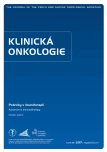-
Medical journals
- Career
Advances in Immunotherapy of Malignant Melanoma
Authors: I. Krajsová
Authors‘ workplace: Dermatovenerologická klinika 1. LF UK a VFN v Praze
Published in: Klin Onkol 2017; 30(Supplementum3): 40-44
Category: Review
doi: https://doi.org/10.14735/amko20173S40Overview
Development of immunotherapy has dramatically changed poor prognosis of metastatic malignant melanoma (MM). Inhibition of immune checkpoints represents a new effective treatment. Monoclonal antibodies against CTLA-4 ipilimumab and against PD-1 (programme death 1) nivolumab and pembrolizumab prolong progression free survival and overall survival (OS) in patients with advanced metastatic MM. Both achieved significant improvement in relapse-free survival and OS also in adjuvant setting. It looks like the efficacy of the combined immunotherapy of ipilimumab with anti-PD-1 antibodies is superior to the monotherapy, but combined therapy is accompanied by higher toxicity. Management of adverse events of ipilimumab plus nivolumab combination were solved in several clinical trials. New combinations such as immunotherapy with intralesional oncolytic vaccination are explored. In this review, some results of clinical trials presented at ASCO (American Society of Clinical Oncology) 2017 are mentioned. Interesting data were obtained from the evaluation of long-term efficacy of immunotherapy in patients who had to stop the treatment for adverse events. Other trial (CheckMate 172) evaluated the safety and efficiency of nivolumab in MM patients who failed on or after therapy with ipilimumab. Considerable attention has been paid to the efficacy of immunotherapy in the treatment of brain metastases.
Key words:
malignant melanoma – immunotherapy – ipilimumab – nivolumab – pembrolizumab – talimogene laherparepvec – brain metastases
The author declares she no potential conflicts of interest concerning drugs, products, or services used in the study.
The Editorial Board declares that the manuscript met the ICMJE recommendation for biomedical papers.Submitted:
31. 8. 2017Accepted:
24. 10. 2017
Sources
1. Ascierto PA, Del Vecchio M, Robert C et al. Overall survival and safety results from phase 3 trial of ipilimumab at 3 mg/kg vs 10 mg/kg in patients with metastatic melanoma. Ann Oncol 2016; 27 (Suppl 6): 379–400. doi: 10.1093/annonc/mdw379.01.
2. Yushak M, Chapman P, Robert C et al. Systemic therapy options for patients with unresectable melanoma. Am Soc Clin Oncol Educ Book 2017; 37 : 661–672. doi: 10.14694/EDBK_174934.
3. Rosner S, Bogatch K, Postow MA. Outcomes of patient with melanoma, who discontinue immunotherapy. J Clin Oncol 2017; 35 (15 Suppl): abstr. 9548.
4. Jansen Y, Rozeman EA, Foppen GM et al. Real life outcome of advanced melanoma patients who discontinue pembrolizumab in the absence of disease progression. J Clin Oncol 2017; 35 (15 Suppl): abstr. 9539.
5. Wolchok JD, Kluger H, Callahan MK et al. Nivolumab plus ipilimumab in advanced melanoma. N Engl J Med 2013; 369 : 122–133. doi: 10.1056/NEJMoa1302369.
6. Hodi FS, Chesney J, Pavlick AC et al. Combined nivolumab and ipilimumab versus ipilimumab alone in patients with advanced melanoma: 2-year overal survival outcomes in a multicentre, randomised, controlled, phase 2 trial. Lancet Oncol 2016; 17 (11): 1558–1568. doi: 10.1016/S1470-2045 (16) 30366-7.
7. Weber JS, Larkin JMG, Schadendorf D et al. Management of gastrointestinal toxicity associated with nivolumab plus ipilimumab or ipilimumab alone in phase II and III trials in advanced melanoma. J Clin Oncol 2017; 35 (15 Suppl): abstr. 9523.
8. Schadendorf D, Wolchok JD, Hodi S et al. Efficacy and safety outcomes in patients with advanced melanoma who discontinued treatment with nivolumab and ipilimumab because of adverese events: a pooled analysis of randomized phase II and III trials. J Clin Oncol 2017: JCO2017732289. doi: 10.1200/JCO.2017.73.2289.
9. Tawbi HA, Forsyth PA, Algazi AP et al. Efficacy and safety of nivolumab plus ipilimumab in patients with melanoma metastatic to the brain: Results of the phase II study Checkmate 204. J Clin Oncol 2017; 35 (15 Suppl): abstr. 9507.
10. Dock G. The influence of complicating diseases upon leukaemia. Am J Med Sci 1904; 127 : 563–592.
11. Pol JG, Rességuier J, Lichty BD. Oncolytic viruses: a step into cancer immunotherapy. Virus Adapt Treat 2012; 4 : 1–21. doi: 10.2147/VAAT.S12980.
12. Chesney JA, Puzanov I, Ross MI et al. Primary results from a randomized (1 : 1), open label phase II study of talimogene laherparepvec (T) and ipilimumab /I) vs I alone in unresected stage IIIB – IV melanoma. J Clin Oncol 2017; 35 (15 Suppl): abstr. e14556.
13. Komatsubara KM, Jeter J, Hauschild A et al. Advances in the treatment of advanced extracutaneous melanomas and nonmelanoma skin cancers. Am Soc Clin Oncol Educ Book 2017; 37 : 641–650. doi: 10.14694/EDBK_175265.
14. Schadendorf D, Ascierto PA, Haanen JB et al. Efficacy and safety of nivolumab in patients with advanced melanoma and poor prognostic factors who progressed on or after ipilimumab: results from a phase II study (Checkmate 172). J Clin Oncol 2017; 35 (15 Suppl); abstr. 9524.
15. Piulats JM, De la Cruz-Merino L, Curiel Garcia TM et al. Phase II multicenter, single arm, open label study of nivolumab in combination with ipilimumab as first line in adult patients with metastatic uveal melanoma: GEM1402 NCT02626962. J Clin Oncol 2017; 35 (15 Suppl): abstr. 9533.
Labels
Paediatric clinical oncology Surgery Clinical oncology
Article was published inClinical Oncology

2017 Issue Supplementum3-
All articles in this issue
- Immunotherapy for Bladder Cancer
- Evaluation of Inflammatory Cells (Tumor Infiltrating Lymphocytes) in Solid Tumors
- Imunoterapie v léčbě karcinomu plic
- Comparison of RECIST 1.1 and iRECIST for Response Evaluation in Solid Tumours
- Advances in Immunotherapy of Malignant Melanoma
- Combined Regimens in Immunotherapy
- Checkpoint Inhibitors in the Treatment of Upper Gastrointestinal Tract Tumors
- Immunotherapy of Renal Cell Carcinoma
- Immunotherapy of Colorectal and Anal Carcinoma
- Clinical Oncology
- Journal archive
- Current issue
- Online only
- About the journal
Most read in this issue- Evaluation of Inflammatory Cells (Tumor Infiltrating Lymphocytes) in Solid Tumors
- Comparison of RECIST 1.1 and iRECIST for Response Evaluation in Solid Tumours
- Immunotherapy of Colorectal and Anal Carcinoma
- Imunoterapie v léčbě karcinomu plic
Login#ADS_BOTTOM_SCRIPTS#Forgotten passwordEnter the email address that you registered with. We will send you instructions on how to set a new password.
- Career

